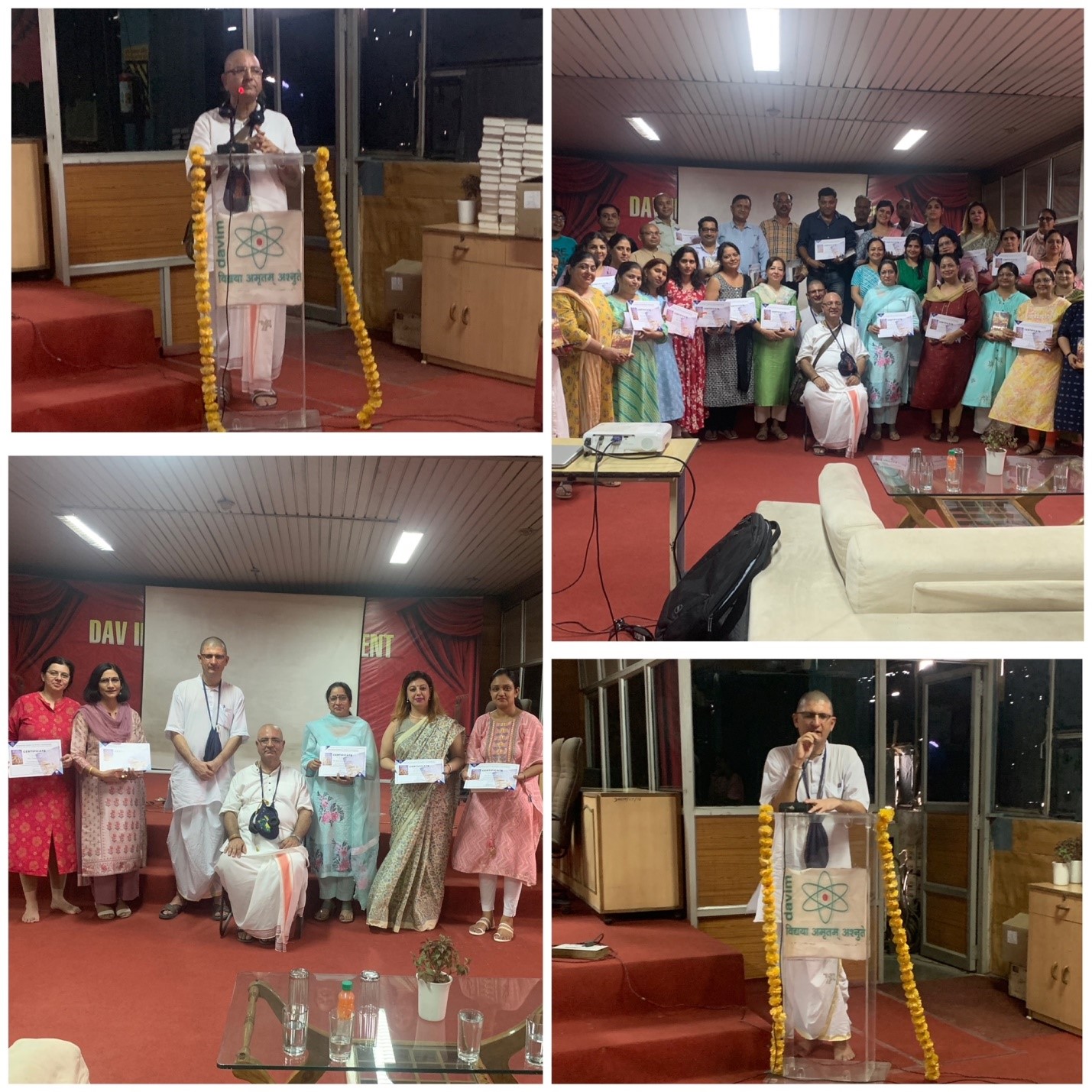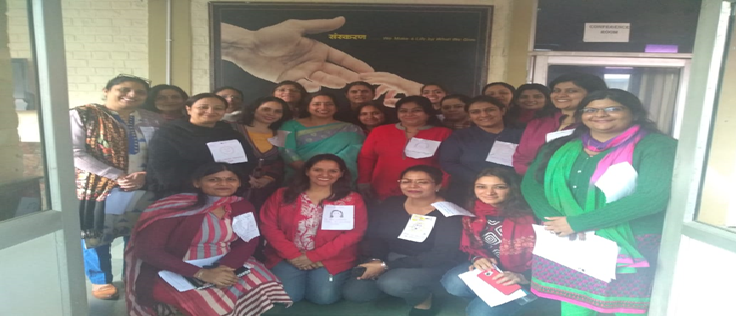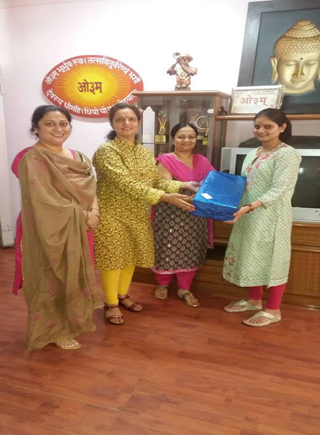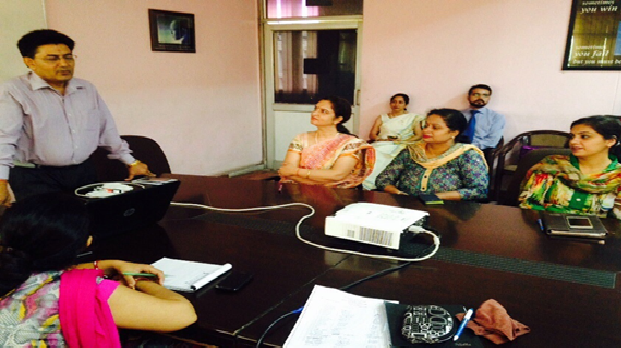The cell has organized programmes in various areas of management, information technology and teaching pedagogy on the topics like 360 degree academicians, Creating healthy and rewarding life, Academic Entrepreneur, Re-skilling and Re training, Class Room Management, Appreciative Enquiry, Experiential Learning, Restoring for future, Manifesting Excellence, etc. And during Pandemic lockdown, DAVIM is using E- Learning platforms like Google meet and Webex for webinars on the topics like Restoring for future etc. We will continue to strive to make Faculty Development Programmes a rewarding experience for educators and look forward to organize many more keeping in mind the changing dynamics of the higher education.

The word “Gita” means “song” in Sanskrit, and “Bhagavad” is an adjective derived from “Bhagavan,” which translates to “God” or “the Divine.” Thus, the Bhagavad Gita can be translated as the “Divine Song” or the “Song of God.”
Resource person Dr. Mohinder Pratap Singh, a cardiologist by profession oriented staff members about what makes the Bhagavad Gita even more intriguing, is its profound impact on a diverse array of brilliant minds from various scientific disciplines, including quantum physics, philosophy, and psychology. The Bhagavad Gita’s legacy has been in the minds of many visionary Physicists Albert Einstein, Robert Oppenheimer, Erwin Schrödinger, Werner Heisenberg to name a few.
The ancient wisdom found within the Bhagavad Gita provided these scientists with profound insights and a deeper understanding of the universe’s complexities. While they approached their scientific work through rigorous methodologies and mathematical formulations, their encounters with the Gita sparked contemplation on the nature of reality, consciousness and the human condition.
Dr. Satish Ahujaa Principal Director also shared his views on various aspects of life and concluded that for those who have conquered the mind and their karma - it is their friend but for those who have failed to do so their mind works like an enemy so let’s all try to conquer our mind through self-realization, self-exploration and by managing The Self.
He appreciated the efforts of FDP Convener/Vice Principal Dr. Ritu Gandhi Arora and its team members Dr. Ashima, Dr. Parul Nagi, Dr. Shobha Bhatia, Ms. Pooja Gour and Dr. Kavita for organizing such a thoughtful session. Session ended with a thanks note to all the faculty members for their patience listening and participation.

DAV Institute of Management, a pioneer in management education known for not only developing students but faculty too. To evolve faculty to the next level, FDP cell organized One week Faculty Development programme on the Essence of Bhagavad Gita in collaboration with ISKON Faridabad from 30th May 2022 to 5th June 2022. The Bhagavad Gita is universally renowned as the jewel of spiritual wisdom all over the world. Gita does not only teach us the way of life but also teaches us all how to manage professional and personal world profusely. Each day of the FDP was dedicated to various preachings of Bhagavad Gita starting with Happiness on Sale, Who am I?, The God Mystery, Why Bad things happen to “Good People” followed by Life Apps. Sessions were taken by ISKON team members namely Shri Gopisvar Das ji, Ms. Pragati Mata Ji, Ms. Sammohini Rupa Mata Ji, Ms. Shubhangi Vrinda Mata Ji, Ms. Gunamayi Mata Ji, Ishwarlila Mata Ji, and Parmeshwari Mata Ji. Resource persons focused on various aspects of life and concluded that for those who have conquered the mind- it is their friend but for those who have failed to do so their mind works like an enemy so let’s all try to conquer our mind through self-realization, self-exploration and by managing The Self. Dr. Satish Ahuja, Principal Director appreciated the efforts of FDP Convener/Vice Principal Dr. Ritu Gandhi Arora and its team members Dr. Ashima, Dr. Parul Nagi, Ms. Pooja Gaur and Dr. Kavita for organizing such a thoughtful session. Session ended with a thanks note to all the faculty members for their patience listening and participation. FDP cell thanks Media team, Administrative team, Estate Team and IT team members for their unconditional support for making this event a success.

Changing market scenario has challenged conventional teaching practices to maintain
competitive advantage for organizations. To manage business organizations it is necessary to
develop competencies that help academicians, understand and predict uncertainty and it is only
possible through progressive development programmes. Keeping its tradition of enriching
faculty, FDP and Publication Cell headed by Dr. Ritu Gandhi Arora and Dr. Ashima Tandon
organized Two Week Faculty Development Programme on LEaD: Leadership, Exploration
and Development starting from 10th Dec, 2018 till 24th Dec, 2018.
Series stared with a session on “Academic Entrepreneurship”. The session was conducted by
Dr. Ritu Gandhi Arora, and focused on an unexplored area of transforming academicians in to
entrepreneurs through and with the efforts of students. Another speaker Ms. Sonam Saluja
focused on that instead of negatively tagging a student a teacher should positively motivate a
student. This will definitely bring out the hidden capabilities of the students. In continuation of
earlier sessions, another week’s series stared with a session on “HRM through Motivation”.
The session was conducted by Mr. S.P.Gaur, and focused on various aspects of motivation and
its importance for today’s faculty and students. The sessions on 18th December were focused on
various health issues for e.g. Dr. Samita S. Kapoor raised her concern about growing eye
problems and its solutions whereas session by Dr. Hema Gulati was on “Grow Good Health",
through home grown organic vegetables and fruits. The session by Dr, Hema Gulati was well
appreciated by all as in today’s scenario when people have very less or no space, she gave tips
to all about terrace farming. Capt. Virender Singh took a session on “Interpersonal
Relationship and Transactional Analysis” and mentioned that faculty can practice this concept
in their classroom teachings as well as in their professional life.
The session culminated with the faculty taking home a lot of learning.

The FDP cell, headed by Dr. Ritu Arora and Dr. Ashima Tandon, organized a workshop on
‘Case Development’, which was taken by Ms. Rohini Vaishnavi.
She took the workshop to
upgrade the Case Development skills of the committed Faculty of DAVIM. The faculty took
keen interest in learning the skills and also drafted Case Studies on different topics related to
their field of expertise.

Col. V.K.Gaur took an FDP, organized by the FDP Cell, at DAVIM, with the Nonteaching
staff members on how to ‘Enhancing Administrative Skills’.
The non-teaching staff need to
draft a lot of office circulars and letters and thus such FDP’s help them in great deal to
overcome any kind of barrier which may come their way in written or verbal
communication. The faculty was more than eager to enhance their administrative skills. The
session was a success.

While many of us are over-stressed these days, the things we are doing to relieve stress don’t seem to be working as well as they used to. What’s different is a chronic stress that is eating into the fabric of our peace and joy. With all the debate on health care reform, very little attention has been given to the cost of stress, financially or to our health, as unable to cope with stress the tempers of anger are rising. Hence, looking into the gravity of the situation the FDP cell headed by Dr. Ritu Arora and Dr. Ashima Tandon of DAVIM, organized a session on 2 nd Sept. 2017, for the faculty members on “Stress and Anger Management” in association with ICFAI Business School.

Permission marketing allows consumers to choose whether or not to be subjected to
marketing. By targeting volunteers, permission marketing assures that consumers pay more
attention to the marketing message. Permission marketing thus encourages consumers to
engage in a long-standing, cooperative marketing campaign.
Hence, to give an insight into
this concept ,which is beneficial to common consumers, Resource Person Dr. Nimit Gupta,
postulated that Marketing communications will not provide desired results if they are not
targeted to the right customers at the right time. He emphasized the words of famous
authors, Milne and Gordon (1993) and discussed the role of customer permission and its
importance in marketing, which has acted as a foundation point of evolution of permission
marketing as a new mantra of ethical marketing.

A session on Financial education was conducted at DAVIM , by Mr. Neeraj Chopra , the
representative of SEBI.
The session was conducted for the helping staff. The speaker
postulated and guided the staff on what kind of Financial Investments they should indulge in
and what should not be done in order to not let their hard earned money get blocked.
The
session was attended by around 25 supporting staff members.

The FDP on Appreciative Inquiry was conducted by Ms. Vasudha Singh.
Appreciative
Inquiry is an Organization Development intervention technique which deals with positive
psychology and has proven to be very effective in personal as well as in professional lives of
individuals. This is a four step process: Discover, Dream, Design and Deliver. Traditional
techniques deal with problem solving, that is, finding out the problems and then seeking
solutions. AI is an appreciative approach to development. It appreciates and values the best
of “what is”.
Appreciation is not just looking at the good stuff, it is to value and recognize
the best in people or the world around us, affirming past and present strengths, successes,
and potentials, and it is to perceive those things that give life (health, vitality, excellence) to
living systems and to increase in value.
The FDP was conducted by Deepak Mukundan, Trainer, Motivator and Vice President of
Pragati Path Foundation Trust.
He used various methods of training such as Silva Mind
Control Method (U.S.A), Meditation and others in a two-day training Programme. His
accomplice Jagdish Gautam, founder Director of Pragati Path Foundation Trust too gave his
inputs on how to listen to our inner self in understanding our identity.
Mr. Deepak showed
the path of responsibility and accountability to the faculty members and to be able to tackle
the life and job problems efficiently and optimistically. He also postulated that if a teacher
goes beyond her work profile and comes forward to work, also, as a counselor for the
students and gets to the root cause of the problem, the youth is facing today, then, definitely
a huge difference can be made in the society. The session culminated with a hope of
understanding ourselves as a human and then beginning to understand others and follow the
road of Joy of giving.

DAVIM’s FDP and Publications Cell, organized an FDP for the energetic faculty members
on “Be a Blogger”. Mr. Himanshu Singhla from Techno Sikshaa enlightened the faculty on
the importance of writing blogs and helped the first time writers in posting their blogs. The
faculty members manifested their writing panache and learnt to voice their concern on
social, political etc issues.
He postulated that the faculty should be consistent with writing
individual blogs or group blogs and express their worthy thoughts. The faculty members
posted their blogs on, Optimism, Khush Raho Aur Auro ko Bhi Rehne Do, Straight forward,
Ingredients of a Good Wife etc.

FDP is the time when the faculty of an institute unleash themselves and makes the statement
more apt that “learning is a lifelong process.” Facilitator Dr. Chavi showed the teachers how
to draft a Case Study on their own and also to analyze it.
She presented two case studies,
with Social and Business Ethics theme and invited the analysis and perspective of the
teachers on it. She made the teachers gather the knowledge on how to prepare their own case
study. She also postulated the need amongst the faculty to let the students know the basics
of case study and make their comprehensions better. Faculty took keen interest in the
session which would help them in enhancing their teaching and it would help them in taking
lectures more effectively.
The Head of the Institute Dr. Neelam Gulati appreciated the
efforts of the organizers and encouraged the faculty to attend more of such FDP’s which
will widen the teaching pedagogy. She also thanked the facilitator for taking a wonderful
and enriching session with the faculty and ignite in them to go one step forward as teachers.
Change is the most dynamic and inevitable aspect. It is the only stable thing in the world.
And, with the advent of globalization, it has become the only life line to exist in this
competitive era.
In turn, these forces impinge directly on the competitive dynamics of the
business school market and indicate both current competitive positioning strategies and
future competitive pathways which schools may choose to follow. And keeping this view in
sight, the FDP cell of DAVIM , Dr. Ritu Arora and Ms. Ashima Tandon had organized the
FDPon Changing Dynamics in Management Education, where the resource persons, Mr.
Praveen Arora and Mr. P. K. Arya, endorsed – Change or Die.
This is the mantra of today in
the corporate world and to some extent in our personal lives also. The participants -
teachers, were made to understand the need and the willingness to change and develop
positive attitude towards change, as, change faces resistance initially.
Faculty development and Publications department had organised Faculty Development
Programme on Implications of Bhagwat Gita in Management.
Session was taken by Col.
V.K.Gaur, an ex faculty DAV institute of Management. He shared his views about the
practical applications of spiritual learning in our day to life.
On an Ice Breaking note resource persons- Mr. Usmani and Mr. Mandhatya were introduced
with the participants and made them aware about the objective of the session.
Programme started with an Introduction of the Mat Lab and followed by Hands on Session
where faculty members were taught about the practical applications of the Mat Lab tools
and its techniques. It was a fruitful interactive session in which all the discussions were held
related to its application in doctoral and M.Phil. thesis. The Session was well appreciated
by all the faculty members who attended the same.

The objective of this FDP was acclimatizing the faculty, research scholars and
academicians with new trends in the field of information technology.
Prof. N.P.Singh
from MDI (Resource Person) provided insights on the practical framework and
applications of information technology in today’s industry familiarize the participants
about the artificial intelligence, way it’s capturing the market and where it is heading? All
the participants appreciated DAV Institute of Management, Faridabad by stating that this
FDP will prove to be an excellent endeavor made by the institute.

Programme started with an Ice Breaking session- Lesser Known followed by various
management activities like Mud & Sculpture (An activity depicting teacher student
relationship) and what can be changed? (What teacher can change among students & what
can’t be changed). Trainers also detailed about the classroom environment by explaining
perception, teachers and students’ behaviour, resources and content. They also explained the
role of teacher in changing environment with dynamic students and qualities of a teacher
that should be!
It was a fruitful interactive session in which all the discussions were held among faculties &
trainers regarding the techniques of managing the students, making the lecture more
effective, improvement techniques for mentoring students & making a strong bond between
two for the effective classroom management. Session was well appreciated by all the faculty
members who attended the same.